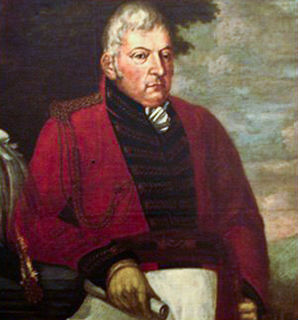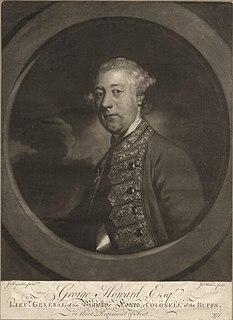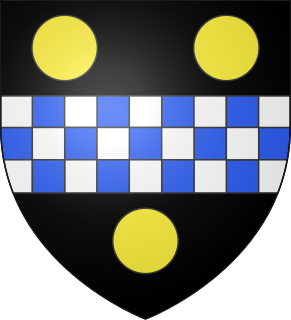 W
WField Marshal Jeffery Amherst, 1st Baron Amherst, was a British Army officer and Commander-in-Chief of the Forces in the British Army. Amherst is credited as the architect of Britain's successful campaign to conquer the territory of New France during the Seven Years' War. Under his command, British forces captured the cities of Louisbourg, Quebec City and Montreal, as well as several major fortresses. He was also the first British Governor General in the territories that eventually became Canada. Numerous places and streets are named for him, in both Canada and the United States.
 W
WField Marshal John Campbell, 2nd Duke of Argyll, 1st Duke of Greenwich,, styled Lord Lorne from 1680 to 1703, was a Scottish nobleman and senior commander in the British Army. He served on the continent in the Nine Years' War and fought at the Battle of Kaiserwerth during the War of the Spanish Succession. He went on to serve as a brigade commander during the later battles of the War of the Spanish Succession. Next he was given command of all British forces in Spain at the instigation of the Harley Ministry; after conducting a successful evacuation of the troops from Spain, he became Commander-in-Chief, Scotland. During the Jacobite Rebellion, he led the government army against the Jacobites led by the Earl of Mar at the Battle of Sheriffmuir. He went on to serve as Lord Steward and then Master-General of the Ordnance under the Walpole–Townshend Ministry.
 W
WMajor-General Sir Edmund Guy Tulloch Bainbridge was a British Army officer who commanded 25th Division during the First World War.
 W
WSir Clive Bossom, 2nd Baronet, was a British Conservative politician and Member of Parliament (MP).
 W
WJohn Sheffield, 1st Duke of Buckingham and Normanby, was an English poet and Tory politician of the late Stuart period who served as Lord Privy Seal and Lord President of the Council. He was also known by his original title, Lord Mulgrave.
 W
WPhilip Stanhope, 2nd Earl of Chesterfield PC FRS was a peer in the peerage of England.
 W
WGeneral Charles Churchill was a British Army officer who served during the War of the Spanish Succession and an English politician who sat in the English and British House of Commons from 1701 to 1710. He was a younger brother of John Churchill, 1st Duke of Marlborough and both his military and political careers were closely connected with his brother's. Along with Marlborough's Irish Chief of Staff William Cadogan, he was one of Churchill's closest advisors. He was a Tory, in contrast to his Whig brother who tolerated and possibly used Churchill's Tory connections.
 W
WLieutenant-General Sir Henry Clinton was a British Army officer and a general officer during the Napoleonic Wars.
 W
WGeneral Sir George Don was a senior British Army military officer and colonial governor during the late eighteenth and early nineteenth centuries. His service was conducted across Europe, but his most important work was in military and defensive organisation against the threat of French invasion during the French Revolutionary and Napoleonic Wars. Don was also frequently requested for advisory and espionage work by British generals and was once employed by the Prussian State as a spy. In 1799 he was arrested during a truce by Guillaume Brune who accused him of attempting to foment rebellion in the Batavian Republic and was not released until the Peace of Amiens. During and following the wars, Don also served as Lieutenant Governor of Jersey and Governor Gibraltar, implementing organizational reforms with much success in both places.
 W
WWilliam Douglas Home was a British dramatist and politician.
 W
WGeorge Joachim Goschen, 2nd Viscount Goschen, was a British politician who served as Member of Parliament for East Grinstead from 1895 to 1906 and as Governor of Madras from 1924 to 1929.
 W
WColonel Richard Stanley Hawks Moody, was a distinguished officer, and historian, of the British Army, during the period of the height of the British Empire. He subsequently became a Military Knight of Windsor.
 W
WField Marshal Sir George Howard KB, PC was a British military officer and politician. After commanding the 3rd Regiment of Foot at the Battle of Fontenoy in May 1745 during the War of the Austrian Succession and after commanding that regiment again at the Battle of Falkirk Muir and the Battle of Culloden during the Jacobite Rebellion, he returned to the continent and fought at the Battle of Lauffeld. He went on to command a brigade at the Battle of Warburg during the Seven Years' War. He subsequently became the Governor of Minorca.
 W
WMajor-General Edward Charles Ingouville-Williams was a British Army officer of the First World War. He was killed in action while serving as commander of the 34th Division.
 W
WMajor-General Robert George Kekewich, CB was a Victorian era British Army officer.
 W
WLieutenant General Sir James Alexander Lindsay, was a British Army officer, Conservative Party politician, and member of Clan Lindsay.
 W
WThomas Innes Pitt, 1st Earl of Londonderry was a British Army officer, speculator and Whig politician who sat in the House of Commons from 1713 to 1728. He served as Governor of the Leeward Islands from 1728 to his death in 1729.
 W
WLieutenant-General Richard George Amherst Luard was a British Army officer who became General Officer Commanding the Militia of Canada.
 W
WLt. Col. Charles Mawhood was a British army officer during the 18th century, most noted for his command during the Battle of Princeton.
 W
WCharles Middleton, 2nd Earl of Middleton, Jacobite 1st Earl of Monmouth, PC was a Scottish and English politician who held several offices under Charles II and James II & VII. He served as Secretary of State for Scotland, the Northern Department and the Southern Department, before acting as Jacobite Secretary of State and chief advisor to James II and then his son James III during their exile in France.
 W
WLieutenant-Colonel Rowland Edward Power was in Command of the 1st Battalion of the South Nigeria Regiment between 1905 and 1906, the 2nd Battalion of the Buffs during World War I, the 1st Battalion of the Buffs at the end of the World War I and, from 1923 until his retirement in 1927, the 1st Battalion of the Buffs in Gibraltar.
 W
WGeneral Sir Charles Thomas van Straubenzee, was a British Army officer. He served as Commander of British Troops in China and Hong Kong, and Governor of Malta.
 W
WGeneral Cyrus Trapaud was a British Army officer.
 W
WGeneral Sir Mark Walker was a British Army officer and an Irish recipient of the Victoria Cross, the highest award for gallantry in the face of the enemy that can be awarded to British and Commonwealth forces.
 W
WGeneral Sir Charles Wills was a professional soldier from Cornwall, who was Lieutenant-General of the Ordnance and Member of Parliament for Totnes from 1718 to 1741.